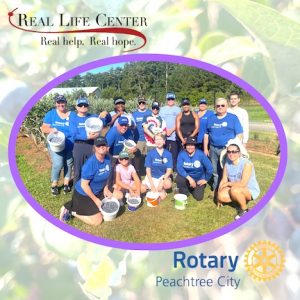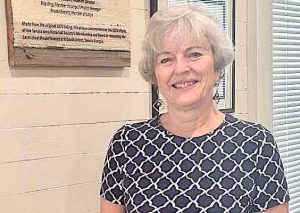Standing on their small farm off Ga. Highway 154 near Sharpsburg last Saturday morning, Scott and Nicole Tyson surveyed the small acreage that is home to the couple’s non-profit 180-degree Farm. The name of the farm makes sense, considering that their approach to farming is the diametric opposite of what has become the accepted norm.
Residents of Fayette County near Peachtree City, Nicole and Scott last year petitioned the Coweta County Commission to amend the zoning ordinance to permit farm operations of less than 10 acres. The commission approved the request and the Tyson family a few months later set out to begin operations with organically grown fruits and vegetables and livestock that are raised using rotational grazing. For Scott and Nicole, the farm is a mission and a ministry and a way to help others avoid the pesticide, herbicide, hormone and antibiotic-laden commercial foods that they believe contribute to cancer and other diseases.
During their first growing season beginning in the spring Nicole and Scott grew an assortment of fruits and vegetables such as melons, squash, tomatoes, peppers, sweet potatoes, eggplant, sunchokes and Yukon potatoes. But there is more to the farm. Up the hill on the south side of the property and grazing in high grass are an assortment of chickens, sheep, turkeys and guineafowl.
“The idea, especially on a small farm, is to maximize what you have,” Scott said.
But, with the livestock, it is the way they are raised that goes against conventional wisdom and corporate mega-farm mentality. The farm utilizes true rotational grazing off land that receives no chemicals of any kind.
“The sheep and the turkeys stay together in one fenced area, the chickens in another because they eat different forage. And the chickens and sheep also eat food from the garden,” Scott said, standing in the tall grass inside one of the forage areas. “Every week we move them, rotating them to new forage areas. God didn’t intend animals to be raised in a monocultural way. Diversity is the key.”
The livestock forage inside large electrically-fenced areas. And there to keep a watchful eye on things is Maddux (named after Greg Maddux), a very large and very amiable Great Pyrenees-Anatolian shepherd mix. The combination of the electric fence surrounding the forage areas and the daunting presence of Maddux is enough to ward off the ill intentions of any uninvited coyotes that frequent the metro Atlanta area.
And on the outside chance that Maddux might need some assistance with the likes of area wildlife set on making a meal of the farm’s livestock, Maddux will soon have the assistance of his younger sibling, Faith. Though still a young puppy, Faith is growing quickly and is already beginning her training to help with duties around the farm.
Scott said only the chickens and turkeys will be processed on the farm, though the turkeys are currently used only for breeder stock, he said. The sheep will be processed off-site, Scott added.
For Scott and Nicole the commitment of working the farm is not a passing fad or a weekend hobby. Aided by intern Caleb Dienethal, Nicole arrives at the farm every morning and is there most of the day. She and Scott and the kids come back to the property after Scott finishes his “regular” job. They family works the farm until dark.
“If I didn’t love it there’s no way I would go through it,” Nicole said with a smile after pushing a heavy wheelbarrow part way across the property. “You see the results when you crack open an egg and see the dark yolk that’s higher in Omega-3 fatty acids and higher in vitamin content.”
Scott and Nicole approached the Coweta County Commission in 2009 after being led to expand their home garden to a much larger, organic operation. Central to their desire was their young son, Mason, who at age three was diagnosed with cancer. Scott told commissioners in 2009 that based on research, he believed the cancer had been linked to pesticides. That reality, he said, had caused him to consider the negative health effects of food grown on conventional farms where pesticides and synthetic fertilizers are commonly used.
Among other examples, Scott cited information from the Toxics Information Project that farmers who frequently use pesticides have a six-fold increase in Hodgkin’s lymphoma. He also cited the nutritional advantages of raising free-range chickens and eating eggs from pasture-raised chickens.
Scott has been gardening since he was young, so the organic garden in their backyard near Peachtree City has been a mainstay for some time. And the desire to have their family and others benefit from organically-grown foods is not a passing whim.
Nicole and Scott anticipate that by next spring or summer they will have a small structure completed that will serve as a farmers market and workshop area for classes relating to organic gardening and farming.
Scott said the goal of the non-profit is to provide a way for local residents to obtain chemical-free foods and to duplicate the farm model in other communities. Yet another goal, one that is intensely personal and born in compassion, has to do with not wanting other children to be susceptible to cancer due to eating chemically-laden food and not wanting other parents to have to stand by and watch as their children have to take even more chemicals to help battle the cancer.
And as for Mason now a few years later, Scott said he believes his son has not had any further health issues because of the quality of the foods he eats.
The Coweta County Commission in its approval of the amendment to the zoning ordinance to allow smaller farm operations on a case by case basis agreed with county Planning Director Robert Tolleson that such operations would support new agricultural endeavors, help preserve the county’s rural character, allow residents to purchase fresh foods and lend to the growing trend of educational experiences through agritourism.
The non-profit 180-degree Farm can be contacted at 678-481-3367 or by visiting http://www.180degreefarm.org/











Leave a Comment
You must be logged in to post a comment.